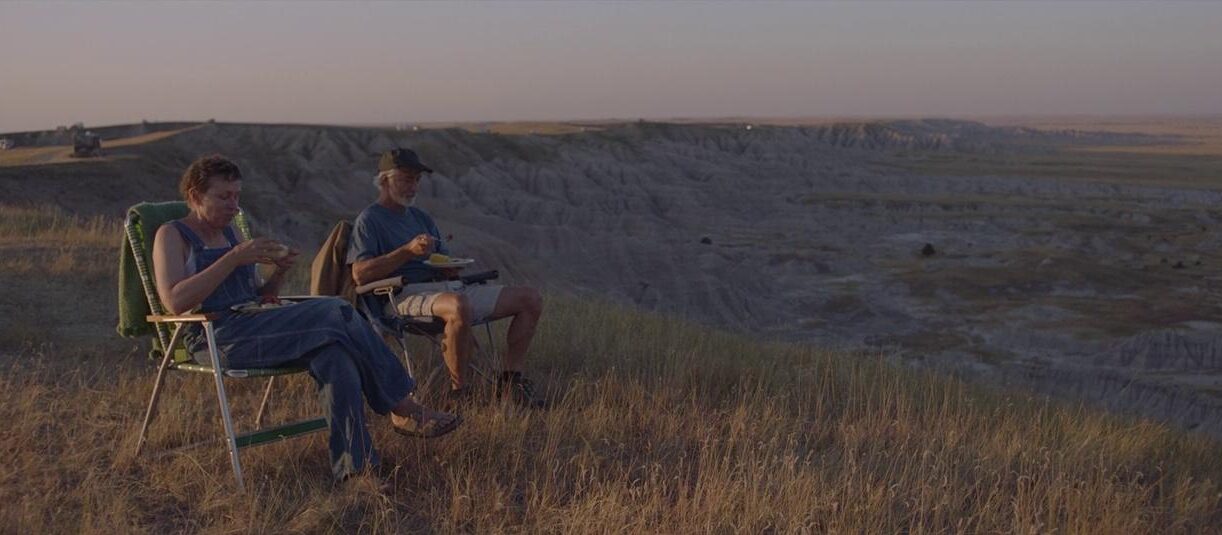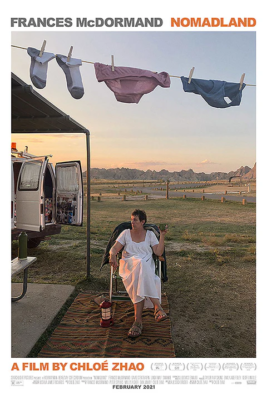

“I’m not homeless. I’m just houseless. Not the same thing, right?”
Nobody wants to admit that exploitation cinema is awesome until films like Crash and Green Book and Nomadland come along and exploit the right cultural trends. But this type of exploitatin film is decidedly not awesome. In fact, Nomadland is downright repulsive—huh, isn’t that how good exploitation films like Ms .45 and Super Fly and Lady Snowblood are usually described?
Directed by Chloé Zhao (daughter of a steel executive turned real estate developer and equity investor) and produced by leading lady Frances McDormand (famous actress, married to Joel Coen, google her net worth), it offers a couple deleterious hours of poverty tourism, giving bourgeois liberals a chance to smile and nod along with McDormand as she listens to the desperate dreams and cherished memories of people who’ve been chewed up and spit out by society and now wander its hinterlands, many of them non-actors who apparently did not realize that they were interacting with a professional actor shooting a narrative film that trivializes their very lives. It’s like putting Cary Grant in a de Sica film. Or like Borat except instead of a comedy it’s Frances McDormand listening to people who actually live lives of deprivation and desperation and acting like she’s been there too, listening to their tragedies and trading fictions back. Like, at one point, Bob Wells, who’s a YouTube celeb RV life guru guy, opens up about his son committing suicide—a seemingly real-life, excruciating human moment, but he’s talking to… Fern, a fictional character. This happens a few times with other people credited as themselves, particularly two older ladies named Linda May and Swankie.
I’ve never read Jessica Bruder’s nonfiction book Nomadland: Surviving America in the Twenty-First Century—the inspiration for the film—but I’d be flabbergasted if it is as self-aggrandizing and out-of-touch as Zhao’s film, which reduces its subjects to zoo exhibits to examine with empathetic condescension. It seems tailored to appeal to the performative activist types who want to feel good about themselves for giving the “houseless” a thought before ordering some avocado toast and a latte on DoorDash for $18 plus a tip. It was probably made with good intentions, but it was also made by people who haven’t touched grass in literal decades, and thus under the guise of being humane and altruistic, it is patronizing and harmful.
Not that I would actually truly know what it’s like to live this perpetual wanderer lifestyle, but I lived out of a backpack for six months while hiking the Appalachian Trail and spent a grand total of like $2000 and I will say that I found a lot of joy and freedom and wonderment and community in that time. If my experience is in any way indicative of what-it’s-actually-like, Nomadland locates very few of this lifestyle’s positive qualities in their proper frame, if it locates them at all. In the world of Nomadland, living in a grungy van that you can’t keep fixed, working endless temp jobs, and trading bric-a-brac with fellow outcasts—these are simultaneously things to gawk at and try on for size. This is what Zhao glamorizes. Not someone thriving while living an unconventional lifestyle, but the tragic realities of impoverished drifting, theorizing that their suffering must be ennobling and thus ultimately a good thing, for them at least. And to be sure, Zhao’s perspective is far from the Christian view of suffering, which sees in it a means of drawing closer to and relying more fully on Christ.
The real haymaker here—the punch that just smashes you in the face with the film’s utterly hollow perspective—is that its main character isn’t even poor. She does all the rubber tramp stuff and integrates herself into the parts of the culture she finds appealing, but she is ultimately LARPing. A perfect surrogate for the intended audience. For her, poverty is a mystical state of mind, a part of her self-identity more so than a material reality she must live with. She has multiple safety nets, and when things get a little too tough to bear, she can trundle on over to her sister’s house and receive an envelope of cash without even asking, or she can settle down with fellow professional-actor-nomad David Strathairn1 (much more tolerable than his costar) at his son’s veritable mansion. She doesn’t have to poop in a bucket, but McDormand pretends to so that we will believe her performance is stunning and brave. It’s like when Christian Bale survived on coffee and apples for however many months when making The Machinist, except as far as I know she only pretended this once and, in fact, the character she’s playing is a pretender as well. Could you imagine Zhao climbing into one of the non-actors vans and asking to film them rocketing diarrhea into a bucket? Of course not. That would be degrading and humiliating. But McDormand gets an Oscar for faking it.
Even a LARPer can be a workable character if Zhao (who also wrote the film) could give her a sense of conflict. In Tim Brayton’s review of the film, he makes an excellent comparison to Andrea Arnold’s American Honey, a film that finds beauty and horror in ditching polite society for a life of open-road poverty. By contrast, Nomadland is so committed to the main character’s perspective that it finds those carefully selected bits-and-pieces of the lifestyle exceedingly romantic. Even the leisurely grind for minimum wage at an Amazon warehouse is a fun little gig every once in a while. There are a few sad anecdotes, sure, but their sadness is poetic, and the resounding message here is that, rather than be a workhorse later put out to pasture, it’s good and beautiful to jump around between soul-sucking minimum wages jobs, sleep in a brokedown car, and eat cardboard until your inability to pay for a small medical expense means that you die. It doesn’t show these bits of indignity, of course, because our LARPer can retreat to creature comforts, but common sense tells you that the nomads who can’t use sis as an ATM are dumpster diving and freezing at night. If you’re gonna commit to the bit you gotta go full Christopher McCandless.
So what message is this film trying to send, exactly? Because I’m more libertarian/free market than 99% of other people who write about film and this gibberish sounds pretty evil to me, a notion only reinforced by its Malick-lite magic hour aestheticization awkwardly combined with its political preaching. I guess most people approach the material the same way Zhao and McDormand wanted them to—these people are doing alright, I guess, yay for me for sparing them a thought, isn’t life wonderful? Nomadland is a vague aphorism that dismisses anything beyond its cozy hedge of virtue signals. It’s arthouse cinema for vacuum skulls and they sucked it right up.
Was there actually a genuine interest in these people on the part of the filmmakers, beyond their exploitability?
1. Strathairn has been in many of John Sayles’ films, most of which are much better than Zhao’s at respectfully defining underprivileged characters.